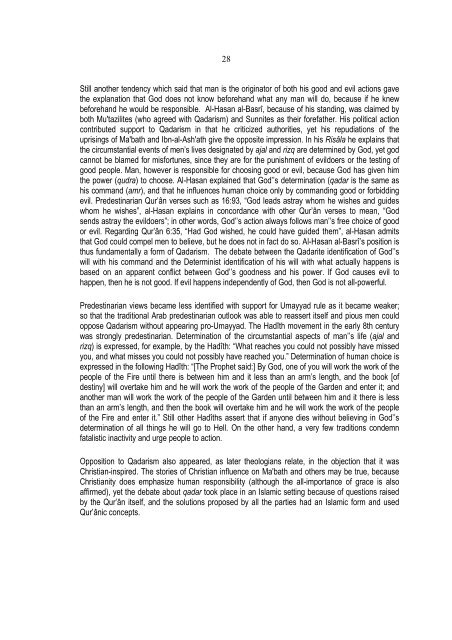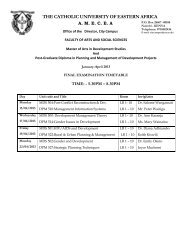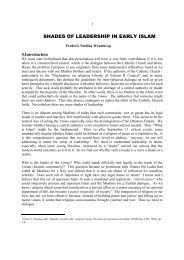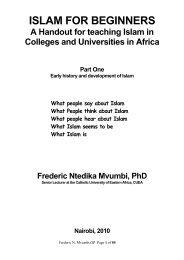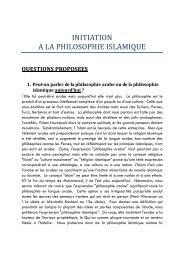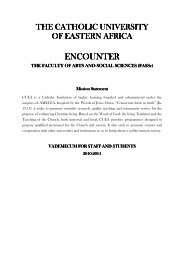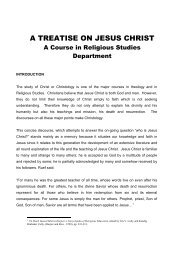INTRODUCTION TO ISLAMIC THEOLOGY.pdf - CUEA
INTRODUCTION TO ISLAMIC THEOLOGY.pdf - CUEA
INTRODUCTION TO ISLAMIC THEOLOGY.pdf - CUEA
Create successful ePaper yourself
Turn your PDF publications into a flip-book with our unique Google optimized e-Paper software.
28Still another tendency which said that man is the originator of both his good and evil actions gavethe explanation that God does not know beforehand what any man will do, because if he knewbeforehand he would be responsible. Al-Hasan al-Basrî, because of his standing, was claimed byboth Mu'tazilites (who agreed with Qadarism) and Sunnites as their forefather. His political actioncontributed support to Qadarism in that he criticized authorities, yet his repudiations of theuprisings of Ma'bath and Ibn-al-Ash'ath give the opposite impression. In his Risâla he explains thatthe circumstantial events of men’s lives designated by ajal and rizq are determined by God, yet godcannot be blamed for misfortunes, since they are for the punishment of evildoers or the testing ofgood people. Man, however is responsible for choosing good or evil, because God has given himthe power (qudra) to choose. Al-Hasan explained that God’’s determination (qadar is the same ashis command (amr), and that he influences human choice only by commanding good or forbiddingevil. Predestinarian Qur’ân verses such as 16:93, “God leads astray whom he wishes and guideswhom he wishes”, al-Hasan explains in concordance with other Qur’ân verses to mean, “Godsends astray the evildoers”; in other words, God’’s action always follows man’’s free choice of goodor evil. Regarding Qur’ân 6:35, “Had God wished, he could have guided them”, al-Hasan admitsthat God could compel men to believe, but he does not in fact do so. Al-Hasan al-Basrî’s position isthus fundamentally a form of Qadarism. The debate between the Qadarite identification of God’’swill with his command and the Determinist identification of his will with what actually happens isbased on an apparent conflict between God’’s goodness and his power. If God causes evil tohappen, then he is not good. If evil happens independently of God, then God is not all-powerful.Predestinarian views became less identified with support for Umayyad rule as it became weaker;so that the traditional Arab predestinarian outlook was able to reassert itself and pious men couldoppose Qadarism without appearing pro-Umayyad. The Hadîth movement in the early 8th centurywas strongly predestinarian. Determination of the circumstantial aspects of man’’s life (ajal andrizq) is expressed, for example, by the Hadîth: “What reaches you could not possibly have missedyou, and what misses you could not possibly have reached you.” Determination of human choice isexpressed in the following Hadîth: “[The Prophet said:] By God, one of you will work the work of thepeople of the Fire until there is between him and it less than an arm’s length, and the book [ofdestiny] will overtake him and he will work the work of the people of the Garden and enter it; andanother man will work the work of the people of the Garden until between him and it there is lessthan an arm’s length, and then the book will overtake him and he will work the work of the peopleof the Fire and enter it.” Still other Hadîths assert that if anyone dies without believing in God’’sdetermination of all things he will go to Hell. On the other hand, a very few traditions condemnfatalistic inactivity and urge people to action.Opposition to Qadarism also appeared, as later theologians relate, in the objection that it wasChristian-inspired. The stories of Christian influence on Ma'bath and others may be true, becauseChristianity does emphasize human responsibility (although the all-importance of grace is alsoaffirmed), yet the debate about qadar took place in an Islamic setting because of questions raisedby the Qur’ân itself, and the solutions proposed by all the parties had an Islamic form and usedQur’ânic concepts.


